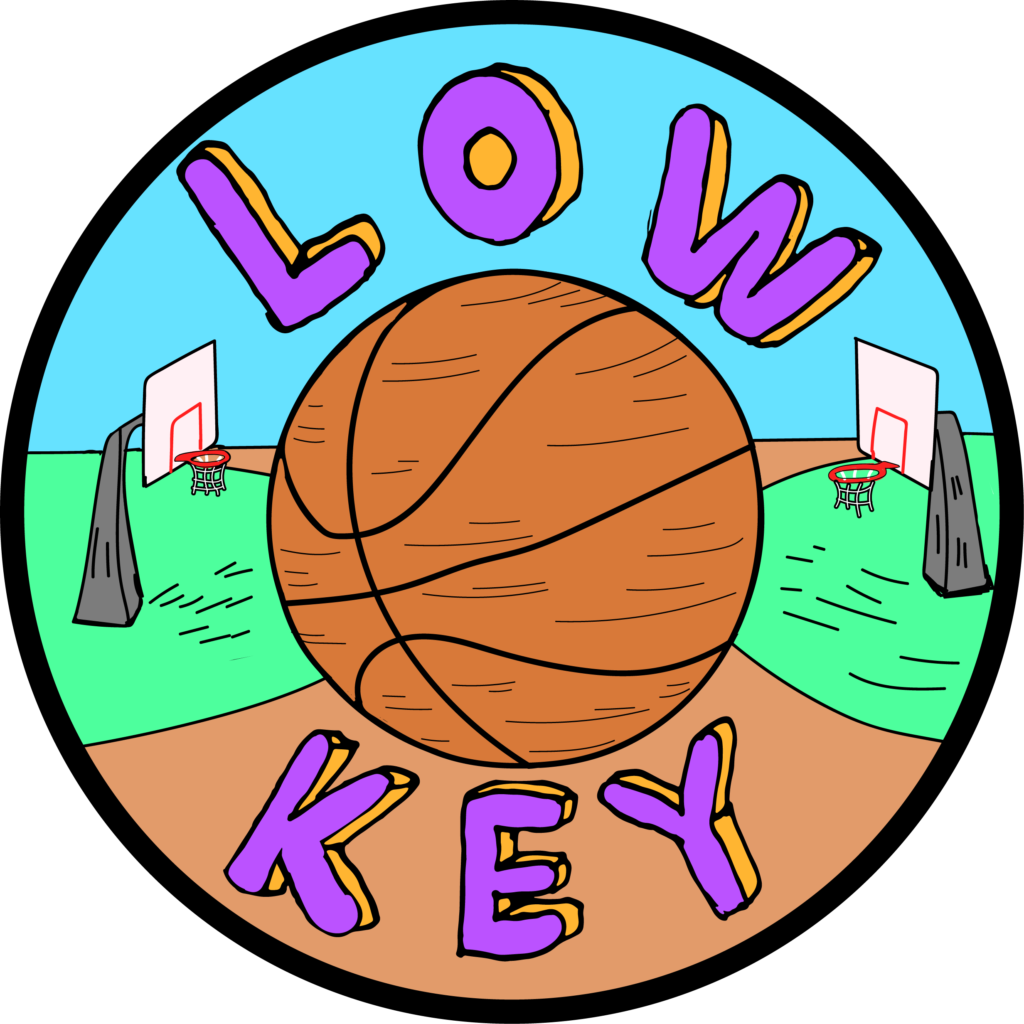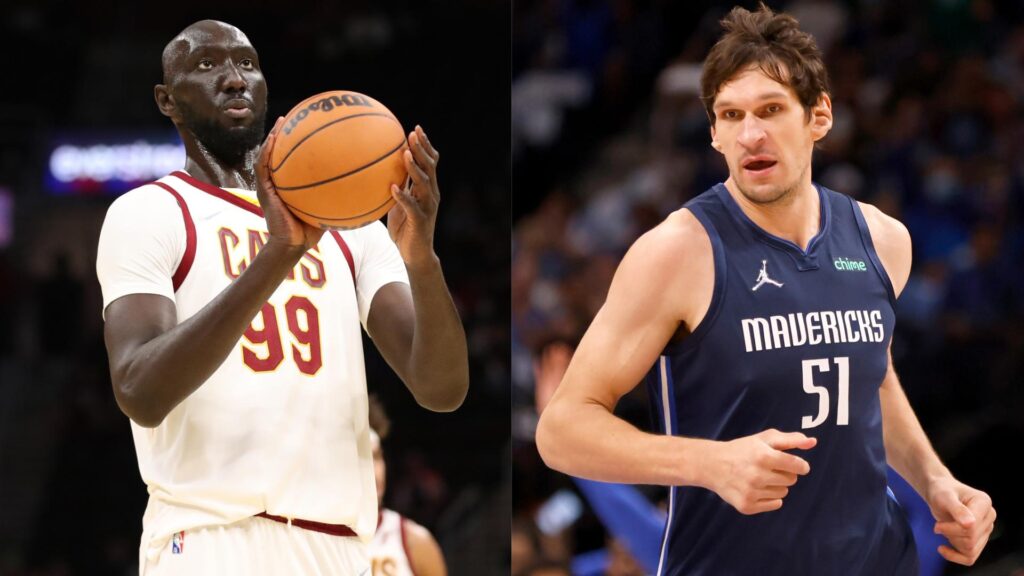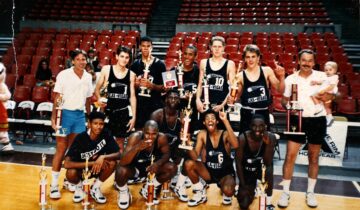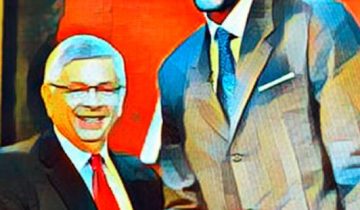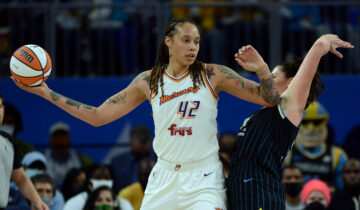Below is a list of countries with some information about the history of basketball in each including the foreign NBA players from each nation to appear in the National Basketball Association:
Uruguay: Basketball in Uruguay began in 1912. The sport’s popularity grew in the country following two bronze medal finishes by the national team in the 1952 and 1956 Olympic Games. Basketball competes with soccer and rugby for popularity as nation’s top sports. Esteban Batista is the only Uruguayan to play in the NBA; he played in 71 games for the Atlanta Hawks from 2005-2007.
US Virgin Islands: There have been three players from the US Virgin Islands to play in the NBA: Raja Bell (12 seasons), Charles Claxton (1), and 5x champion and 2x MVP Tim Duncan (19). The national team has been competing in international tournaments, such as The Pan American Games, FIBA AmeriCup, and Central American Championship, since 1971.
Tunisia: Formed in 1956, the Tunisian Basketball Federation (FTBB) is the governing body of basketball in Tunisia. The FTBB is a member of FIBA and the FIBA Africa zone. The Tunisian national basketball team competed internationally for the first time in the 1957 Pan Arab Games. Salah Mejri of the Dallas Mavericks is the only Tunisian player to ever play in the NBA.
Trinidad and Tobago: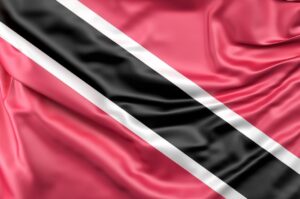 Basketball has risen in popularity in the country since the second half of the 20th century. The sport is played at the grassroots, high school, and club levels.
Basketball has risen in popularity in the country since the second half of the 20th century. The sport is played at the grassroots, high school, and club levels.
The national team began competing in international tournaments in the 1971 Centrobasket, finishing in 6th place.
Trinidad and Tobago won four straight gold medals in the FIBA CBC Championship from 1986-1990. Carl Herrera and Kenny Charles are the only two players from Trinidad and Tobago to play in the NBA.
Philippines: Basketball is the most popular sport in the Philippines. It is played at both the amateur and professional levels. It was first introduced to the nation early in the 20th century; it was taught by Americans through the YMCA and school systems. Two Filipino-Americans have played in the NBA. The first was Raymond Townsend who played at UCLA in the 1970’s and was drafted by the Golden State Warriors in 1978. The other is Jordan Clarkson of the Cleveland Cavaliers. However, perhaps the most prominent Filipino-American in the NBA is 2x championship coach Erik Spoelstra of the Miami Heat.
Tanzania: Basketball is generally learned in schools at a young age in Tanzania. Institutions such as the Tanzania Basketball Federation provide and maintain the country’s basketball infrastructure including the national team and the NBL, Tanzania’s highest professional league. Hasheem Thabeet is the only player from Tanzania to play in the NBA. He was drafted in 2009 by the Memphis Grizzlies after playing collegiately at the University of Connecticut and played in the league for four teams over five seasons.
Switzerland: It is one of the founding members of the International Federation of Basketball (FIBA). The Swiss national team was once a major player on the global stage, though it has declined in prominence in recent decades. Switzerland premiered in international competitions in FIBA EuroBasket 1935. Both of Switzerland’s NBA players are active: Thabo Sefolosha of the Utah Jazz and Clint Capela of the Houston Rockets.
South Korea: South Korea is not known for its production of foreign NBA players. Ha Seung-jin is the only South Korean to play in the NBA. He was the 46th overall pick in the 2004 draft by the Portland Trail Blazers. Along with baseball, soccer, and rugby, basketball is among the most popular sports in South Korea. The nation’s highest level professional league, the Korean Basketball League (KBL), was founded in 1997 and consists of ten teams. The national team joined FIBA in 1947 and is one of the preeminent teams of FIBA Asia based on the number of overall medals won in international competition which includes a record 24 medals won at the FIBA Asia Championship.
Slovakia: Slovak basketball dates as far back as 1919. The sport’s governing organization is the Slovak Basketball Association which was founded in 1993 and joined FIBA the same year. The highest tier professional basketball league in Slovakia is called Extraliga. The national team has yet to qualify for any Olympic games, world, or European championships. However, the women’s team has had more success, participating in the 2000 Olympics. Richard Petruska is the only Slovak player to play in the NBA, appearing in 22 games for the Houston Rockets during the 1993-94 season.
Romania: Romanian representation in the NBA has consisted of two players: Gheorghe Muresan (6 seasons) and Ernie Grunfeld (9 seasons). The latter, Grunfeld, currently serves as the general manager of the Washington Wizards. Muresan is recognized as the tallest player in NBA history. Founded in 1950 and consisting of 24 teams, the Liga Nationala is the top-tier professional basketball league in Romania. The country joined FIBA in 1932 as one of the organization’s co-founding nations. Romania has participated in Olympic basketball only once, in 1952. Basketball is very popular among Romanian youth.
Israel: Basketball is immensely popular in Israel. Together with soccer, it is one of the nation’s two premier sports. On the club level, Israel has a multi-tiered professional basketball league system. On the international level, Israel competes as a member of FIBA Europe with both their men’s and women’s teams. Outdoor basketball courts are commonplace in parks throughout the country. Many former NBA and NCAA players end up playing in Israel on the club level. Perhaps the most prominent among them is former NBA All-Star Amare Stoudemire who currently plays for Hapoel Jerusalem of the Israeli Premier League and the Basketball Champions League. Three players have represented Israel on the NBA level: Omri Casspi, Gal Mekel, and TJ Leaf.
Qatar: Basketball has become increasingly popular in Qatar. Established in 1964, the Qatar Basketball Federation (QBF) administers basketball in the country. Qatar was admitted into FIBA Asia in 1979. The top domestic professional basketball league is the Qatari Basketball League. A women’s league was established in 2012. Qatar is involved in the bidding process for hosting rights of the 2023 FIBA World Championship. There were two American-Qatari players to play in the NBA: Jarvis Hayes and Trey Johnson.
Norway: Milt Palacio and Torgeir Bryn, who only played in three games, are the only Norwegians to play in the NBA. The Norwegian national basketball team played its first international game in 1966, losing 39-74 to Iceland. Norway is one of Europe’s most populous nations to never qualify for a major international basketball competition.
New Zealand: Basketball was introduced to New Zealand during the first decade of the 20th century. It was initially called “indoor basketball” in order not to be confused with Netball, an English offshoot of basketball played outdoors by females. During World War II, many New Zealanders were shown the sport by American troops. The first national tournament took place in 1938 and the sport became a hit with locals, especially among the youth. Although there is only one professional team, the New Zealand Breakers, which belongs to the Australian professional league, there are numerous semi-pro leagues. There have been three players from New Zealand to play in the NBA: Sean Marks, Kirk Penney, and Steven Adams (currently of the OKC Thunder).
Mali: Only two Malian players have ever played in the NBA: Soumaila Samake and current member of the New Orleans Pelicans, Cheick Diallo. Mali joined FIBA in 1961. The national team has yet to appear in the FIBA World Championship and its best finish at the FIBA Africa Championship came in 1972 when they achieved a bronze medal finish. Soccer remains the country’s most popular sport while basketball remains significantly behind but is gradually growing as the sport’s presence is spreading worldwide.
Macedonia: The Basketball Federation of Macedonia is the governing body of basketball in Macedonia. The Federation was established in 1992, following the breakup of Yugoslavia and joined FIBA in 1993. It organizes the domestic premier league and runs the national team. Soccer is the country’s favorite sport by a large margin, but other popular sports in Macedonia include volleyball, wrestling, as well as basketball. Two players from Macedonia have played in the NBA: Pero Antic and current Cleveland Cavalier, Cedi Osman. Also, Darius Washington Jr. is an American-Macedonian who played 22 games for the San Antonio Spurs during the 2007-08 season.
Libya: The Libyan Arab Basketball Federation (LBF), an affiliate of FIBA Africa since 1961, is the governing body of men’s and women’s basketball in Libya. According to certain Americans that play professionally in Libya, the style of play is more aggressive and physical than the way the sport in played in most other countries. The national team is currently 157th in the FIBA rankings. Hiram Fuller and Randy Holcomb are the only two players of Libyan descent to play in the NBA. However, each of them only played in four games at the NBA level.
Japan: Basketball has seen a recent revival as far the game’s popularity in Japan. This is due in large part to emergence of two Japanese players, Yuta Tabuse and Yuta Watanabe, both of whom have played in the NBA albeit in a minimal capacity. American-Japanese player, JR Sakuragi (formerly Henderson) also had a short stint in the NBA after being drafted 56th overall in 1998 out of UCLA. The Japan national team has won the FIBA Asia Championship twice and has qualified for the event 25 out of 26 times. Japan hosted the 2006 World FIBA Championship and was announced to co-host the 2023 FIBA Basketball World Cup. The primary league in the country is the B.League.
Iran: Iran has a strong national basketball team and are considered among the elite national teams in Asia. Iran cemented their reputation as a top-tier team in Asia when they won the gold medal at the 2007 FIBA Asia Championship, the country’s first continental title. They competed in the Olympics as recently as 2008 in Beijing, qualifying for the tournament due to their Asian championship the previous year. Hamed Haddadi became the first (and only) Iranian NBA player when he debuted for the Memphis Grizzlies in 2008.
Iceland: Organized by the Icelandic Basketball Federation and dating back to its inaugural season in 1952, Urvalsdeild karla (Men’s Premier League) is the highest professional basketball competition among clubs in Iceland and the outcome determines the national champion. Iceland joined FIBA in 1959. The Icelandic national team often participates in European tournaments including the Games of the Small States of Europe. Petur Guomundsson is the only Icelandic player to ever play in the NBA. There are currently no NBA prospects from Iceland.
Cuba: Basketball is a popular sport since the Revolution in 1959. However, the height of basketball in Cuba was undoubtedly in the early 1970’s when the country began to make waves competitively on the international level. The national team followed its third place finish in the 1970 University Games by defeating the American team at the 1971 Pan American Games and then taking home the bronze medal at the 1972 Olympics. At the time, basketball was the number two sport in Cuba, only trailing baseball in popularity. Since then, basketball has waned in popularity in Cuba as their competitiveness internationally steadily decreased. Andres Guibert and Lazaro Borrell are the only two Cuban players to make it to the NBA. However, both had very limited stints in the league, playing 22 and 17 games respectively.
Belgium: Xavier Henry, DJ Mbenga, and current Knicks’ point guard Frank Ntilikina are the only players of Belgian descent to play in the NBA. Founded in 1928 and consisting of 10 teams, the Pro Basketball League (aka EuroMillions Basketball League) is the highest tier level basketball league in Belgium.
Austria: Jakob Poltl of the San Antonio Spurs is the only NBA player ever of from Austria. Austria is currently ranked 55 in the FIBA rankings despite basketball being far less popular in the country than traditional winter sports and having not qualified for FIBA EuroBasket since 1971. Founded in 1947 and consisting 9 teams, the Österreichische Basketball Bundesliga is the highest tier domestic professional basketball league in the country.
Montenegro: For a country with less than a million residents, Montenegro is proportionately very well represented in the NBA. Former NBA players with Montenegrin descent include Zarko Cabarkapa, Omar Cook, Quincy Douby, Predrag Drobnjak, Slavko Vranes, and Nikola Pekovic. There are also two current Montenegrin NBA players: Nikola Vucevic of the Orlando Magic and Nikola Mirotic of the New Orleans Pelicans. Internationally, Montenegro has been fairly successful since 2010 including a first place finish in the 2015 Games of the Small States of Europe as well as qualifying for FIBA EuroBasket in 2011, 2013, and 2017.
Hungary: Kornel David is the lone Hungarian player to reach the NBA. He participated in 109 games in his NBA career, starting 11 of them. The Hungarian national team had its greatest success from the 1940s to the 1960s, winning numerous medals on the global level and qualifying for the Summer Olympics four times in that span. With recent international success following a long draught, Hungary may be poised to produce some NBA prospects in the coming years and perhaps even the country’s second NBA player.
Guyana: The national team has had fairly impressive international success for a country with limited basketball resources including several medals at the FIBA CDC Championship and winning the silver medal at the 1994 Caribbean Basketball Championship. The only two Guyanese NBA players both had very limited stints in the league with one player, Jason Oliver Miskiri, playing in just a single NBA game and the other, Rawle Junior Kalomo Marshall, playing in 63 games over two seasons. There are two domestic professional leagues in Guyana: LABA DIV 1 and GABA DIV 1.
Ghana: The only NBA player from Ghana in league history is Benjamin Bentil. Bentil was drafted by the Boston Celtics in 2016 but was later waived. He played in just three regular season games in his career for the Dallas Mavericks. His final landing spot in the NBA was for the San Antonio Spurs’ summer league team in 2017. The next Ghanaian NBA player might not surface for a while considering that Ghana is Africa’s most populous nation to never qualify for a major international basketball tournament.
Gabon: Yann Stephane Lasme is the lone NBA player from Gabon to make it to the league. His NBA career was very short lived however, playing in just 16 games during the 2007-08 season for the Miami Heat and Golden State Warriors. The Gabon national has had limited success in international competition with an 8th place finish at AfroBasket 2015 being the nation’s best placement ever.
Finland: Two Finnish players and one American-Finnish player have made the NBA. The best among them is up-and-coming star Lauri Markkanen of the Chicago Bulls. Finnish born Hanno Aleksanteri Mottola was first player from Finland to play in the NBA and Erik Murphy, an American-Finnish player, was drafted 49th overall in 2013 by the Bulls out of the University of Florida but unfortunately never played a regular season game in the NBA. Murphy has represented Finland internationally as a member of the national team since 2014. Finland joined FIBA in 1939 and is currently 21st in the FIBA rankings.
Estonia: Martin Muursepp is the only Estonian player in NBA history. Estonia originally joined FIBA in 1939 before eventually leaving the organization only to rejoin FIBA in 1991. The Estonian national team currently stands at 47th in the world according to the FIBA rankings. The country first competed internationally at the 1936 summer Olympics. Their best finish is 5th place in EuroBasket in five appearances. Especially of late, Estonia has not produced much NBA talent and there is little evidence we will see the second Estonian NBA player anytime soon.
Egypt: Joining FIBA in 1934, Egypt has had plenty of international success including a record 17 medals won in FIBA Africa Championships and winning the 1949 EuroBasket title. Egypt has produced two NBA players: Abdel Nader and Alaa Abdelnaby. The governing body of the sport of basketball in Egypt is the Egyptian Basketball Federation.
Dominica: Despite playing a grand total of four games in the league, Garth Joseph remains the only NBA player ever from Dominica. The country joined FIBA in 1976 and currently stands at 160th in the FIBA rankings. The best result of the national basketball team in international competition was a 6th place finish at the 2000 Caribbean Championship. The national federation that oversees basketball in the country is the Dominica Amateur Basketball Association.
Democratic Republic of Congo: The Congo hasn’t produced many foreign NBA players but the few they have were either successful in the league, such as the nation’s most prominent basketball export- DPOY and All-Star Dikembe Mutombo, or have shown promise. The three other Congolese NBA players are Bismack Biyombo of the Charlotte Hornets, Emmanuel Mudiay of the New York Knicks, and former 2009 first round draft pick Christian Eyenga. The national has not been quite as successful. DR Congo has yet to qualify for the FIBA World Championship despite joining FIBA in 1963. Its biggest success internationally was a final four placement at the 1975 FIBA Africa Championship when they competed as Zaire. DR Congo is currently 84th in the FIBA rankings.
Czech Republic: An impressive number of players from the Czech Republic have made the NBA considering it is a small and young country with a limited basketball presence. The country only began to compete on the international level following the breakup of Czechoslovakia in 1993. Their best result to date is a seventh place finish at EuroBasket 2015. Despite a limited basketball history, the Czech Republic has produced four foreign NBA players including Washington Wizards’ guard Tomas Satoransky, former 6th overall draft pick Jan Vesely, Jiri Welsch, and George Zidek.
Cape Verde: There 60 professional basketball clubs in Cape Verde as of 2018. The 60 teams are spread across eleven divisions on nine islands. Two of the islands, Santiago and Santo Antao, have consisted of two zones or divisions since the early 2000s. The basketball association’s governing is known as Capeverdean Basketball Federation or FCBB. The FCBB was founded in 1986 and became affiliated with FIBA in 1988. The national team’s greatest accomplishment to date is earning the bronze medal at AfroBasket 2007. Walter Tavares remains the only Cape Verdean to play in the NBA.
Cameroon: Basketball in Cameroon has rapidly increased in popularity- closing the gap with soccer as the nation’s favorite sport- since the mid-2000s. The upward trend is partly due to the recent success of the national team as well as particular Cameroonian players. Cameroon has turned into a legitimate force in international competition both in Africa and globally. Cameroon has the most current foreign NBA players of any country in Africa with three. Since their silver medal finish at the 2007 FIBA Africa Championship, Cameroon has become a consistent contender for the African basketball crown. Four Cameroonian players have played in the NBA: Ruben Boumtje Boumtje, Luc RIchard Mbah a Moute, Pascal Siakam, and All-Star center Joel Embiid. It would not be a stretch to assume that we will see more players from Cameroon in the league in the coming years.
Bulgaria: There have been just two Bulgarian players to be selected in the annual NBA draft, but only one to play in a regular season NBA game. Priest Lauderdale played briefly for the Denver Nuggets before returning to play professionally in Bulgaria. Aleksandar Vezenkov was a second round selection in 2017 by the Brooklyn Nets but has yet to make his NBA debut. Vezenkov is currently a member of the Bulgarian national team. Bulgaria’s best performances in international play came back in the 1950’s. Bulgaria won the Balkan Championship in 1950 and finished as runners-up at the 1957 EuroBasket Championship.
Bosnia and Herzegovina: In recent years Bosnia and Herzegovina has become a prolific source of NBA talent. The nation has already produced five foreign NBA players, including one currently active player, and more are expected to follow with at least ten current potential NBA prospects and counting. The current Bosnian player in the NBA is Jusuf Nurkic of the Portland Trail Blazers. Mirza Teletovic captained the Bosnia and Herzegovina national team and has played in the NBA as recently as the 2017-18 season. The national team regularly qualifies for EuroBasket and currently is 42nd in the FIBA rankings despite only competing internationally (and being an independent nation) for 25 years.
Belize: Basketball in Belize is governed by the Belize Basketball Federation (BBF). The highest level of competitive basketball in Belize is semi-professional with the most prominent of these leagues being the Belize Basketball Association (BBA). There is a basketball in every neighborhood and children can often be seen practicing on them. Basketball is played at the junior, senior amateur, high, and primary school levels. In addition, there are often tournaments held for little kids as well as over-35 tournaments for retired players. Belize has held regional championships in the Caribbean (1998) and Central America (2001) but has never qualified for the Olympics. Despite limited international prominence in the sport, a number of players of Belizean descent have played in both the NBA and NCAA.
Belarus: The Belarusian Premier League is the highest professional basketball league in Belarus. The league was established in 1992 and consists of ten teams. Belarus is Europe’s most populous nation to never qualify for a major international basketball competition. There has only been one player of Belarusian heritage to play in the NBA. Maalik Benjamin Wayns, a naturalized Belarusian born in America, played in a limited capacity for multiple teams from 2012-2014.
The Bahamas: There have been four Bahamian players to play in the NBA including 2x champion with the LA Lakers of the 1980’s Mychal Thompson (father of current Warriors Guard Klay Thompson) and current Sacramento Kings Guard and former top ten pick Buddy Hield. The Bahamas joined FIBA in 1962 and are currently slotted at 58th in the FIBA rankings. The Bahamas won the gold medal at the 2014 FIBA CBC Championship.
Antigua and Barbuda: The nation joined FIBA in 1976 and is currently ranked 75th according to FIBA rankings. The national team has made eight appearances in the Caribbean Championship, earning a bronze medal finish three times. The only representative to play in the NBA is Julius Hodge. Hodge, though born in Harlem, NY, has lived in Antigua for most of his life. Hodge played college basketball at North Carolina State where he had a very successful four years that including individual accolades such as ACC POY and being named an All-American. His collegiate success led to him being the 20th overall selection in the 2005 NBA draft. Unfortunately, his NBA career did not match his collegiate one. His time in the league was short-lived, lasting only until 2007, and was marred by constant trades until he finally left to play professionally in Italy.
Nigeria: Nigeria was introduced to the sport of basketball in the 1950’s by a man named Wallad Zabadne who taught youngsters the game on the country’s only court at the time. He would go on to spread the game throughout the nation, making basketball mainstream in Nigeria. The Nigerian national team joined FIBA in 1964. Nigeria’s current FIBA ranking is 32nd worldwide. Beginning in 1994 when two Nigerian players debuted in the NBA until today a total of 16 players of Nigerian descent have played in the NBA. At this rate, there is good reason to expect more to follow in the future.
Lithuania: Lithuania is a nation with a passion and devotion for basketball. It is arguably ahead of soccer as the country’s favorite sport. It is this devotion that allows the Lithuanian national team to be a European basketball powerhouse despite its relatively small population of roughly 2.8 million citizens. Lithuania became one of the earliest members of FIBA when it joined the federation in 1936. Today, according to the FIBA rankings, the Lithuanian national basketball team is the 6th best in the world. With its basketball prowess as a country, it comes as no surprise that 10 Lithuanian nationals have played in the NBA including four current players.
Italy: At least nine Italian nationals have played in NBA including current Houston Rockets coach Mike D’Antoni, former number one overall draft pick Andrea Bargnani, and current players Marco Belinelli of the SA Spurs and Danilo Gallinari of the LA Clippers. Domestically, the professional basketball system in Italy is a series of interconnected competitions for pro clubs. The system or pyramid consists of nine tiers with a hierarchical format including promotion and demotion system based on performance. The top tier of professional basketball in Italy is Lega Basket Serie A (LBA). Italy was co-founding nation of FIBA and joined at its inception in 1932. Italy currently ranks 14th in the world according to FIBA. The national team has achieved much success in international competitions including two Olympic silver medals (12 appearances), 10 medals (2 gold, 4 silver, 4 bronze) won in 37 appearances in EuroBasket, and 8 appearances in the FIBA World Cup.
Basketball is a global sport and it’s an incredible thing that so many foreign countries are involved. UNICEF, which helps children worldwide, has a partnership with the NBA, and all major sports, and is heavily involved in charitable causes geared toward getting children to take up sports (and basketball) worldwide.
